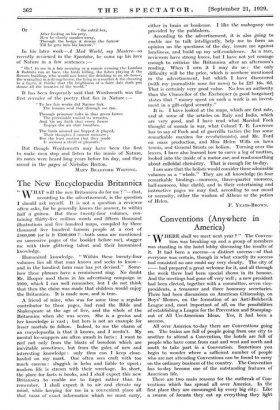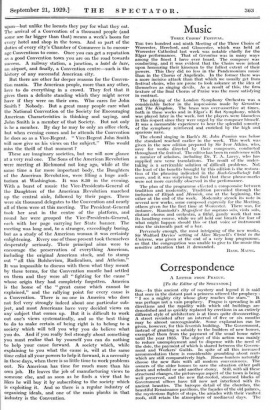Conventions (Anywhere in America)
44
HERE shall we meet next year ? " The Conven- tion was breaking up and a group of members was standing in the hotel lobby discussing the results of it. It had been a success—a distinct success—of that everyone was certain, though in what exactly its success had consisted no one could say very clearly. The city of — had prepared a great welcome for it, and all through the week there had been special shows in its honour. And the meetings had gone off very well ; a new president had been elected, together with a committee, seven vice- presidents, a treasurer and three honorary secretaries. There had been discussions on American Citizenship, on Boys' Homes, on the formation of an Anti-Bolshevik League and, most important of all, on the possibilities of establishing a League for the Prevention and Stamping- out of All Un-American Ideas. Yes, it had been a success.
All over America to-day there are Conventions going on. The trains are full of people going from one city to another to attend a Convention, the hotels are full of people who have come from east and west and north and south to take part in a Convention. Sometimes you begin to wonder where a sufficient number of people who are not attending Conventions can be found to carry on the ordinary business of the country. The Convention has to-day become one of the outstanding features of American life.
There are two main reasons for the outbreak of Con- ventions which has spread all over America. In the first place they are encouraged by every big city. Like a swarm of locusts they eat up everything they light upon—but unlike the locusts they pay for what they eat. The arrival of a Convention of a thousand people (and some are far bigger than that) means a week's boom for every hotel and shop in the town. And so part of the duties of every city's Chamber of Commerce is to encour- age Conventions to come. Once you can get a reputation as a good Convention town you are on the road towards success. A railway station, a junction, a hotel de luxe, an airport, and finally, a Convention centre—such is the history of any successful American city.
But there are other far deeper reasons for the Conven- tion mania. The American people, more than any other, love to do everything in a crowd. They feel that it gives them a definite standing which they might never have if they were on their own. Who cares for John Smith ? Nobody. But a great many people care what the National Convention of the Society for Encouraging American Characteristics is thinking and saying, and John Smith is a member of that Society. But not only is he a member. By day he may be only an office clerk, but when evening comes and he attends the Convention he does so as a Vice-Regent. " Vice-Regent John Smith will now give us his views on the subject." Who would miss the thrill of that moment ?
These are imaginary societies, but we will now glance at a very real one. The Sons of the American Revolution were meeting at Richmond not long ago: while at the same time a far more important body, the Daughters of the American Revolution, were filling a huge audi- torium at Washington. It was 8.30 in the evening. With a burst of music the Vice-Presidents-General of the Daughters of the American Revolution marched up the central aisle, followed by their pages. There were six thousand delegates to the Convention and nearly all of them were at this meeting. The President-General took her seat in the centre of the platform, and round her were grouped the Vice-Presidents-General, each with her page carrying her S tate banner. The meeting was long and, to a stranger, exceedingly boring, but as a study of the American woman it was certainly enlightening. Every one of those present took themselves desperately seriously. Their principal aims were to encourage the preservation of everything American, including the original American stock, and to stamp out " all this Bolshevism, Radicalism, and Atheism." It was impossible to discuss with them what they meant by these terms, for the Convention mantle had settled on them and they were all " fighting for the cause " whose origin they had completely forgotten. America is the home of the " great cause which cannot be explained," and the rallying point for every cause is a Convention. There is no one in America who does not feel very strongly indeed about one particular sub- ject, and most Americans have very decided views on any 'subject that comes up. But it is difficult to work out one's views systematically, and so the best thing to do to make certain of being right is to belong to a society which will tell you why you do believe what you do. And if you really feel strongly about something you must realize that by yourself you can do nothing to help your cause forward. A society which, while explaining to you what the cause is, will at the same time enlist all your powers to help it forward, is a necessity in these days, when there is so little time to work problems out. No American has time for much more than his own job. He leaves the job of manufacturing views to someone else, and as soon as he finds a view that he likes he will buy it by subscribing to the society which is exploiting it. And so there is a regular industry of organizing ideals, and one of the main planks in that industry is the Convention.













































 Previous page
Previous page